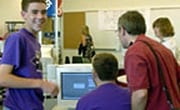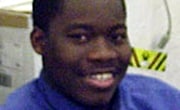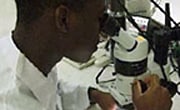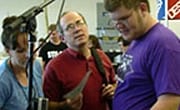|
a report from
Bess Stephens
Director, HP Philanthropy and Education
In our 2000 fiscal year (ended October 31), Hewlett-Packard
Company broadened and deepened a 61-year commitment to our
communities through cash and equipment grants to nonprofit
organizations and the creation of innovative programs that
are changing the way we do philanthropy.
HP gave approximately $51.7 million in cash and equipment
to universities, schools, hospitals and charitable organizations
around the world. A decrease of just over $6 million from
our 1999 total is due primarily to the spin-off of Agilent
Technologies from HP.
Approximately $15 million of the total went to grant recipients
outside the United States. The balance went to a wide array
of U.S. recipients supporting education, health and human
services, civic and environmental causes, and arts and culture
organizations at the national or local (plant-community) level.
As always, our giving reflects the company's long-standing
commitment to good corporate citizenship, which dates back
to our founding in 1939.

We also undertook an internal reassessment of our programs
by reviewing with our philanthropic stakeholders -- grant
applicants, grant recipients and advisors -- our focus areas,
grant programs and processes.
By examining and ultimately "reinventing" our programs, we
are positioned to more effectively address the most substantive
issues where we believe HP can make a significant contribution.
As a company, HP has a vision of the future where technology
is accessible to everyone in the world as a means to learn,
work and benefit from information.
Consistent with this vision, our Philanthropy and Education
programs are today focusing the majority of our resources
on developing and supporting programs and partnerships that
promote educational opportunity and e-Inclusion for people
in underserved communities in the U.S. and around the world.
Nearly 65 percent of our worldwide giving in 2000 was earmarked
for education. We helped four-year colleges and universities
and community colleges improve instruction by deploying state-of-the-art
equipment in their teaching and research laboratories.
For example, HP donated more than $1.2 million in "e-services"
grants to 12 U.S. colleges and universities.
These projects will examine the technical, social and/or business
implications of Internet-based services and will rapidly transfer
knowledge gained in an academic setting into the public domain.
We contributed HP equipment valued at more than $280,000
to the University of Wisconsin's Mechanical Engineering program
for a high-profile, high-impact HP Visualize Center in UW's
eMedia Center. The equipment serves more than 2,100 students
for collaborative efforts in undergraduate program instruction,
technology demonstrations, student projects and directed coursework.

Our contributions in recent years to the Institute
for Women in Technology (HP equipment valued at $740,000
and $75,000 in cash in 2000) are supporting the creation of
Virtual Development
Centers in which non-technical women join with female
university students and faculty and female engineers in industry
to design and create useful new technologies. IWT is working
to transform engineering education so that more women from
broad populations pursue technical careers. Three centers
opened in 2000 at Smith College (Northhampton, MA), the University
of Colorado-Boulder and the University of Arizona (Tucson,
AZ).
Systemic improvements are at the heart of our $4 million
Diversity in Education (DEI) program, which builds partnerships
between universities and K-12 schools. In 2000, we began the
fourth year of a five-year program that aims to increase the
number of African American, American Indian, Latino and female
students who ultimately gain employment in engineering or
computer science fields.
In each of our four partnerships -- in San Jose, CA (with
San Jose State University), Los Angeles, CA (with the University
of California at Los Angeles), Boston, MA (with Northeastern
University), and El Paso, TX (with the University of Texas
at El Paso) -- the elementary, middle and high schools and
universities cooperatively build a science and mathematics
"track" that moves students from hands-on science programs
in elementary schools through college enrichment programs
and internships. The El Paso partnership was transferred to
Agilent Technologies with the spin-off.

As part of the DEI program in 2000, we presented 31 HP Scholars
with $12,000 scholarships, three paid summer internships at
HP and HP computing equipment. We've presented 95 awards since
the program began in 1997.
Our K-14 programs help students prepare for success in the
workforce of the future by making math and science exciting
and meaningful, giving all students the opportunity to succeed,
and helping every child enter school ready to learn. Contributions
of cash and HP equipment are only part of the equation; we
believe systemic improvements in public education are essential
to encourage a viable, productive workforce.
Science programs for girls received HP support in Canada
through a $270,000 contribution to Actua
and its innovative learning programs. The cash and equipment
grant was directed to an initiative that facilitates science-oriented
all-girls summer day camps, residential programs and science
clubs. Actua estimates more than 7,000 girls participated
in these programs in 2000.
We awarded the final round of our three-year $90,000 U.S.
Hands-on-Science grants in 2000 to K-12 school districts in
Vista, Los Angeles and Sacramento, CA; Vancouver, WA; Nampa
and Boise, ID; Irving, TX; Atlanta, GA; and Cambridge, MA.
This program has awarded over $5 million in grants to more
than 60 K-12 school districts in nine states since 1992. Hands-on-Science
grants are helping 16,000 teachers improve science instruction
for more than 350,000 K-6 students.
Hands-on math and science is the focus of the HP Tech 2000
Lab at Mountain View High School in Loveland, Colorado, where
students work in teams on real-world projects that apply math
and science principles. HP donated $65,000 worth of computing
and imaging equipment.
As a founding member of the D21 Initiative -- a partnership
between government, technology companies and social service
organizations that's leading Germany into an information and
knowledge-based economy -- HP granted more than 250,000 DEM
(US$115,000) worth of HP PCs, scanners, printers and other
equipment to create digital classrooms at the Martin-Luther
High School in Wittenburg. It's expected these contributions
will enhance Martin-Luther High's existing exchange programs
with partner schools in the Netherlands, Sweden, Italy, the
Czech Republic and Israel.
 |

The HP Company Foundation, a separately
incorporated non-profit organization, distributed
cash grants totaling $1.4 million in 2000 in support
of important regional issues.
For example, in the San Francisco Bay Area, Silicon
Valley is experiencing a shortage of qualified
teachers because of high housing costs. HP responded
with a $1 million cash pledge from the HP Company
Foundation to the Housing
Trust of Santa Clara County to help struggling
teachers find a home near the school where they
teach. The Housing Trust estimates HP's grant
will assist approximately 250 teachers.
The HP Company Foundation partnered with HP's
Boise, ID, site to contribute $300,000 for the
construction of the Hispanic Cultural Center of
Idaho in Nampa. The center will be a regional
focal point for the preservation, development
and celebration of Hispanic culture and arts.
HP also successfully lobbied for state funding
for this project. |

|
 |
About 12 percent of our grants in 2000 went to
health & human services organizations worldwide. HP and its
employees contributed $6.4 million through the company's Charitable
Giving campaign, which supports United Way and other nonprofit
social service organizations in the U.S.
Five percent of our grants were allocated to important environmental
and civic issues. For example, PowerUP
bridges the Digital Divide by ensuring that America's underserved
young people acquire the skills, experiences and resources
they need to succeed in the digital age. The collaboration
includes dozens of non-profit organizations, corporations
and government agencies. HP donated $335,000 worth of equipment
in 2000 and will contribute an additional $1.8 million in
2001. HP chairman and CEO Carly Fiorina serves on PowerUP's
board of directors.
The Intel Computer
Clubhouse is a partnership between Intel, HP, Adobe, Macromedia
and Autodesk to create computer "clubhouses" in
under-served communities in the U.S. The model for the network
was developed by the Museum of Science in Boston and the Massachusetts
Institute of Technology Media Lab, and focuses on creative
learning through art, music and multimedia programs. HP donated
more than $400,000 worth of equipment in 2000, and has committed
to a $1 million contribution in 2001.

Three percent of our contributions went to arts and culture
organizations. For example, in 2000 HP launched an "Art
and Science" collaboration between the Centre of Research
and Restoration of the Museums of France, the National Gallery
in London, and several European museums and universities.
The initiative uses HP computers and digital imaging equipment
to assist with the restoration of classic works of art, including
digital imaging and storage of art and cataloging. This program
aims to use the power of modern technology to preserve the
richness and diversity of art, and to make it accessible to
all.
Each of our HP businesses worldwide funds grant programs
to help fulfill our local citizenship obligations. In 2000,
employee committees made donations totaling $5.8 million in
support of local issues and organizations.
HP and our employees donated more than $4.1 million in cash
and HP equipment through our funds-matching
program for U.S. colleges and universities and product-gift
program for U.S. educational institutions.
Employees also gave thousands of hours of their time to support
educational programs and other community interests. While
these hours aren't included in our philanthropic totals, they're
just as valuable as the actual gifts we make.
In 2000, HP introduced its Digital
Village program, a $15 million venture that brings together
technology, brainpower and raw, collaborative energy to reinvent
how a few underserved communities address their most pressing
issues. Three U.S. communities will receive approximately
$5 million worth of HP products, services and support over
three years, and HP will collaborate with each community to
develop a plan that guides the investments.
East Palo Alto, CA, was selected in 2000 to be the first
Digital Village. (The Southern California Tribal Association,
located in the San Diego area and East Baltimore, MD's, Empowerment
Zone were announced
as HP Digital Villages Feb. 14, 2001.)
We believe Digital Village will set a new standard for how
HP and other companies contribute to their communities, and
we view this program as a model for new directions in philanthropy
at HP.
Digital Village reflects our major philanthropic focus in
2001: e-Inclusion and education.
"e-Inclusion" is HP's business strategy for broadening access
to social and economic opportunities in developing countries
through the creative application of technology.

We are developing philanthropic and education solutions that
will contribute to this strategy in disadvantaged communities.
We intend to creatively work with our communities to address
important local issues in the most substantive ways we can.
We believe the best way to reach our vision will be through
strategic partnerships with a variety of other organizations,
the use of HP solutions (hardware, software, services, consulting
and volunteers) and a more focused approach that will likely
result in fewer, but more substantive contributions.
We will continue to make some relatively modest grants to
a wide variety of organizations. And we will continue to support
small, focused local programs that address our key objectives.
But it's clear that major initiatives aligned with HP's goals
and strengths afford us the most promising opportunities to
make meaningful change.
While we are proud of our philanthropic history, we believe
our best days are yet to come. Information technology is making
into the ordinary what was only recently the unimaginable.
Our challenge -- and our commitment -- is to contribute where
we can to ensure its benefits and opportunities are available
to everyone.
Palo Alto, California
February 28, 2001
 
 
 
|
